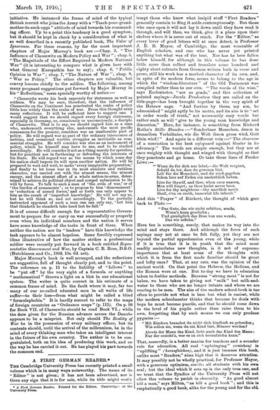A FIRST GERMAN READER.* THE Cambridge University Press has recently
printed a small volume which is in many ways noteworthy. The name of its " Editor " is not given; it has not been advertised, nor is there any sign that it is for sale, while its title might easily • A First German Baader. Printed for the Editor. Cambridge : at the University Prose.
tempt those who know what insipid stuff "First Readers" generally contain to fling it aside contemptuously. But those
who once open it will not lay it down until they have read it through, and will then, we think, give it a place upon their
shelves where it is never out of reach. For the "Editor," as every lover of good letters will at once detect, is Professor J. E. B. Mayor, of Cambridge, the most venerable of English scholars, and one who has never yet printed
anything but what was of the best. Nor has he here fallen below himself, for although in this volume he has done
little more than collect and translate some hundred and eighty short extracts from German writers both in verse and prose, still his work has a marked character of its own, and, in spite of its modern form, seems to belong to the age in which the " wisdom-literature " of the Old Testament was compiled rather than to our own. ." The words of the wise," says Ecclesiastes, "are as goads," and this collection of pointed sayings—.Tacula Prudentum they are called on the title-page—has been brought together in the very spirit of the Hebrew sage. "And further by these, my son, be admonished" might aptly be its motto, and its aim is to " set in order words of truth," not necessarily easy words but rather such as will " give to the young man knowledge and discretion." Here, for instance, is something from Richard Rothe's Stifle Standen :—" Sonderbare Menschen, denen in demselben Verhaltniss, wie die Welt ihnen gross wird, Gott klein wird !" And again in a different vein :—" The clearness of a conviction is the best safeguard against bluster in its advocacy." The words are simple enough, but they are at once weighty with thought and winged with thought so that they penetrate and go home. Or take these lines of Feodor Lowe :—
We Wenn du far dich nur lebst,—die Welt vergisst, Sebald du tot, dass du gewesen bist.
Leb' fur die Menscheit, and dir wird gegeben Schen hier auf Erden ein nnsterblich Leben.
Live for thyself, and thee, when once unseen, Men will forget; as thou hadst never been. Live for thy neighbour—thy unselfish merit Shall, e'en on earth, immortal life inherit."
And this " Prayer " of Riickert, the thought of which goes back to Plato :—
" Das Gute, das wir nicht erbitten,
Wenn's kann geschehn ; End gnadiglich das Bose von uns wende, Das wir erfiehn."
Here too is something, surely, that makes its way into the mind and stays there. And although the force of such sayings may not at once be felt fully, yet they are not beyond the partial apprehension even of the young, while if it is true that it is in youth that the mind most readily assimilates new thoughts, is it not of supreme importance that at least some of the thoughts with which it is from the first made familiar should be great
and lofty ones ? That, at any rate, was the opinion of the ancient world. On that point the Hebrew, the Hellene, and the Roman were at one. But to-day we have in education
taken to feebler methods. Because "strong meat" is not for babes, we have taken to giving not " milk" but milk-and- water to those who are no longer infants and whom we are rearing to be men. The aim of the modern school-book is too• often to provide not what is best but what is easiest, while the modern schoolmaster thinks that because he deals with,
boys he must become puerile, and that he should come down to the level of his pupils rather than raise them to his own, forgetting that by such means we can only produce pygmies :—
" Mit Binders brauchst du nicht dich kindisch sm geberclen Wie sollen sie, wean du sin Kind bist, Manner werden?
Alswie der Mann daa Kind, liebt such des Kind den Mann: Nur der erzieht's, wer es zu sich heraufziehn kann."
That, assuredly, is a better maxim for teachers and a sounder rule for education. All real " upbringing " (ersiehen) is " uplifting " (heraufziehen), and it is just because this book, unlike most "Readers," aims high that it deserves attention. It may possibly not be wholly practical, for Professor Mayor, with a generous optimism, credits all students with his own zeal; but the ideal which it sets up is the only true one, and we trust that the Syndics of the University Press will not allow this volume to perish in obscurity. " As good almost kill a man," says Milton, "as kill a good book " ; and this is emphatically a good book, alike for the young and for the old.










































 Previous page
Previous page